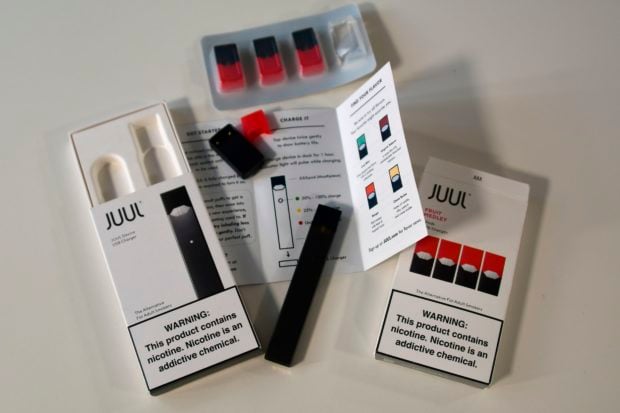- The FDA says its statistics on teen e-cigarette use show that widespread use of e-cigarettes, like those sold by Juul Labs, is reversing a trend of falling teen tobacco use rates.
- Juul took steps to cut its appeal to minors Nov. 13, but its critics say the company has already cemented its popularity with teens.
- The statistics come as the FDA proposes changes to limit minors’ ability to buy Juul products in stores and online.
Accusations that e-cigarette giant Juul built its empire in part by marketing its products to teenagers have resurfaced after the U.S. Food and Drug Administration (FDA) announced its intent to crack down on widespread underage e-cigarette use Thursday.
Juul, worth roughly $16 billion, has distanced itself from its early ads featuring bright colors and youthful models to promote flavored e-cigarettes, which are believed to appeal to teens especially. But Juul’s current focus on its initial customer base, adults trying to quit smoking tobacco, is too late, Matthew Myers, president of the Campaign for Tobacco-Free Kids, told The Daily Caller News Foundation.
“What we’ve found was from the very beginning, the manner in which Juul launched its product and all of its early marketing campaigns literally duplicated the kind of imagery the cigarette companies used 50 years ago to appeal to young people,” Myers told TheDCNF. “It was followed up by social media campaigns using similar imagery, young people by-and-large engaged in lifestyle activity that emphasized Juul’s role in being a happy, young, sexually attractive, socially successful person.”
The FDA’s renewed interest in e-cigarettes comes as the number of high school students who reported vaping in the previous 30 days skyrocketed. High school students classified as “current e-cigarette users” increased 78 percent between 2017 and 2018 to 3.05 million, according to a portion of the National Youth Tobacco Survey published Thursday. That’s roughly 21 percent of high school students, according to the FDA. (RELATED: Juul Temporarily Stops Selling Flavored E-Cigarette Pods As FDA Tries To Limit Underage Usage)
After rumors of an FDA crackdown especially on flavored e-cigarettes sold both in stores and online, Juul said Nov. 13 it is deactivating its Facebook and Instagram accounts. Juul, which controls roughly 70 percent of the U.S. e-cig market, has also removed “inappropriate material from third-party accounts” like videos that show younger people vaping, the company said on its website Nov. 13.
“There is no question that this user-generated social media content is linked to the appeal of vaping to underage users,” Juul wrote on the webpage Nov. 13. “This is why we have worked directly with social media platforms to remove tens of thousands of inappropriate posts.”

Signs in the window of the Smoke Depot advertise electronic cigarettes and pods by Juul, the nation’s largest maker of e-cigarette products, on September 13, 2018 in Chicago, Illinois. Scott Olson/Getty Images
The FDA investigated Juul for potentially targeting teens in its ads and even seized documents from Juul’s San Francisco headquarters to look for evidence on Sept. 28, reported CBS News. But Myers said the ads it used to launch its products use techniques that implicitly target teens.
“If you want to advertise to adolescents, you don’t use super old people and you don’t use adolescents. Every adolescent wants to be a successful 20- to 25-year-old … and that’s what the Juul ads were,” Myers told TheDCNF.
Juul asserts it has never marketed to anyone underage. (RELATED: The FDA Commissioner Called Teen Vaping An Epidemic And Is Going After Juul. Here’s Why)
“In fact, we have done very little marketing relative to our growth,” Juul Labs spokesman Ted Kwong told TheDCNF. “The advertising mentioned was in 2015, short-lived, intended for adults and had very little impact on our growth … Our current marketing features former adult smokers who have switched to JUUL, and we also launched an educational campaign for parents.”
Silicon Valley e-cig startup Juul is facing a public health backlash for claims that it marketed to youth. The company maintains it did no such thing. Here’s a photo from its 2015 launch party https://t.co/aH7FpkbsLY pic.twitter.com/SunbehgZvz
— Erin Brodwin (@erbrod) August 27, 2018
To Myers, many of Juul’s marketing and public relations moves have parallels with the tobacco industry of a bygone era, including Juul’s failed attempts to get schools to use an anti-vaping curriculum it developed. The New York Times described the program as a “free, three-hour curriculum provided by Juul to discourage teens from using e-cigarettes by teaching them about their brains and giving them mindfulness exercises.”
Critics of the program said it needed to teach more than mindfulness, according to CNN.
“Juul said that it was developed based upon a program that Stanford University has,” Myers told TheDCNF. “What they didn’t say was that they eliminated the parts that the Stanford people found absolutely essential. They took out of the curriculum the section with the risks of flavors appealing to kids. … They also built the curriculum so that it was curriculum for e-cigarettes and marijuana so that the point of comparison wasn’t not smoking but was marijuana.”
Juul also included its logo “prominently” on the curriculum materials, Myers said.
“Studies of cigarette company curricula show that when kids see the logo for the cigarette company on school curriculum it adds to the credibility of the company and actually was associated with the increased likelihood that the kids would use the product, not a lower one,” Myers said.

An illustration shows the contents of an electronic Juul cigarette box in Washington, DC October 2, 2018. EVA HAMBACH/AFP/Getty Images
Even if the FDA shoves flavored e-cigarette pods, including those sold by Juul, out of convenience stores for good, there’s still the fear that teens will deal Juuls and accessories to one another. Many teens do not understand how much nicotine one Juul can deliver and how quickly they can get hooked, Myers told TheDCNF. Some don’t even realize Juuls are e-cigarettes.
“During the last year and a half we’ve been hearing a lot of anecdotes from kids who say, ‘The first week I was using Juul, I did it because I thought it was cool. The second week I used Juul, I did it because I had to,'” Myers told TheDCNF.
E-cigarette giant Juul announced it would temporarily stop selling several flavors of its e-cigarette pods Nov. 13 after rumors of an announcement from the FDA about the agency’s plans to crack down on teen use of the company’s products and similar devices.
The FDA fines some retailers that sell e-cigarette products and accessories to minors. The FDA launched a “blitz” against 40 retailers to crack down on illicit sales in April.
Follow Evie on Twitter @eviefordham.
Send tips to evie@dailycallernewsfoundation.org.
All content created by the Daily Caller News Foundation, an independent and nonpartisan newswire service, is available without charge to any legitimate news publisher that can provide a large audience. All republished articles must include our logo, our reporter’s byline and their DCNF affiliation. For any questions about our guidelines or partnering with us, please contact licensing@dailycallernewsfoundation.org.


